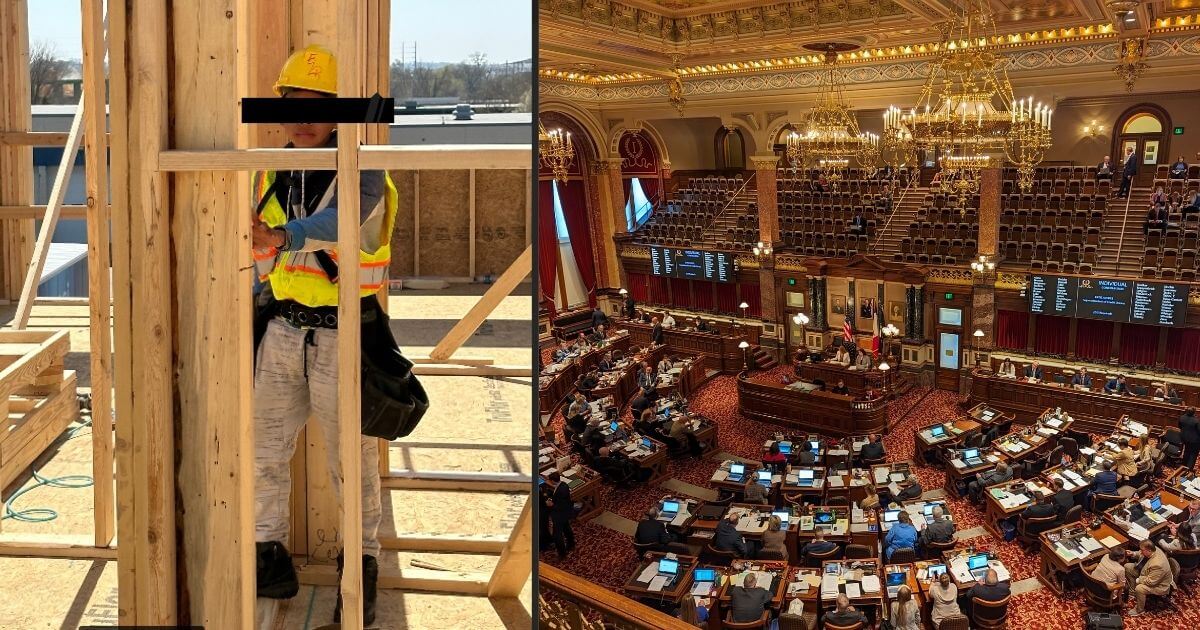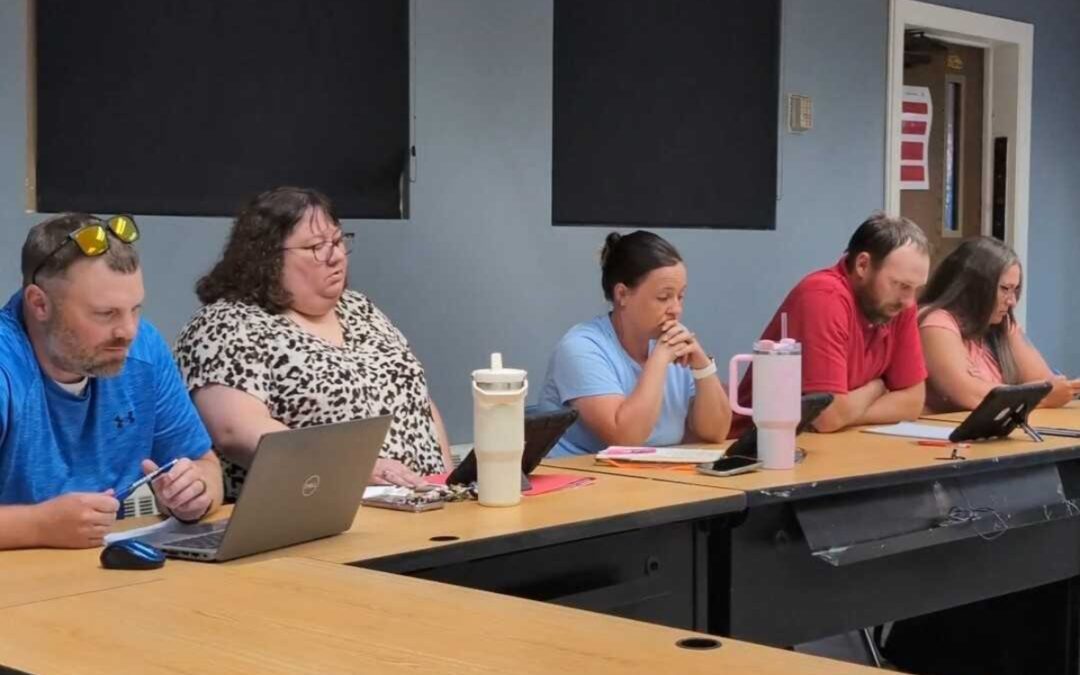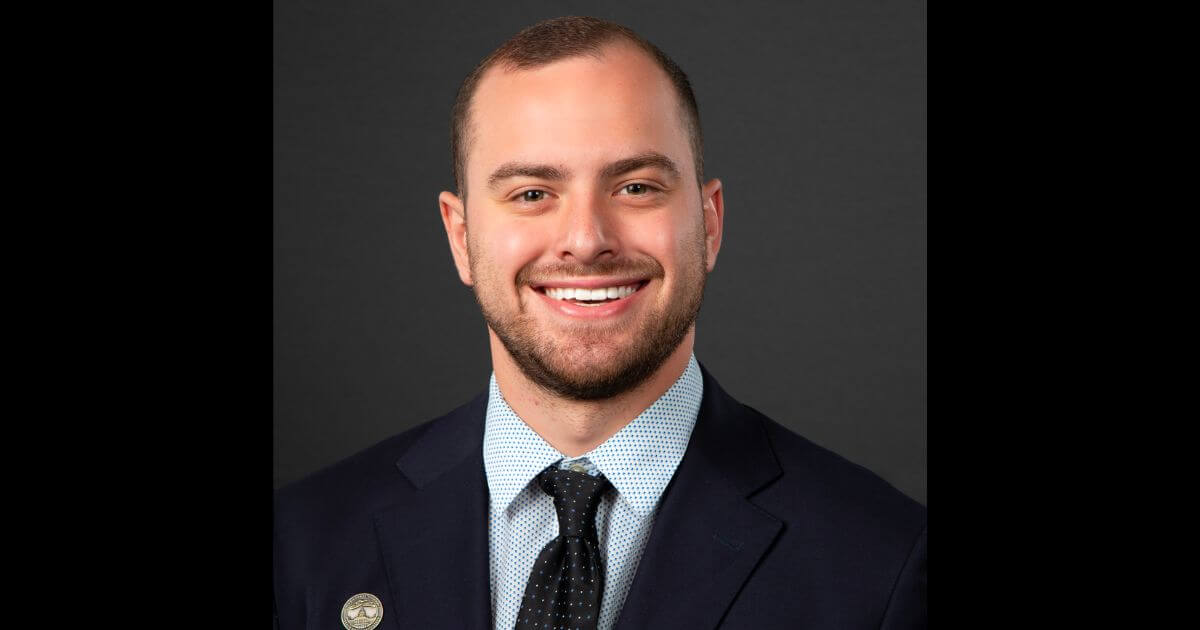
Photos: (L) Suspected child laborer in Cedar Rapids/Photo submitted by Rep. Sami Scheetz (R) Iowa Senate chamber on April 17. Photo by Starting Line staff
Iowa Senate Republicans have a solution for the state’s ongoing workforce shortage: Child labor.
In a 32-17 vote just before 5 a.m. Tuesday morning, the Senate advanced SF 542, which relaxes Iowa’s child labor laws and allows teenagers to work in more hazardous job conditions, including some that contradict federal law. Sens. Charlie McClintock (R-Alburnett) and Jeff Taylor (R-Sioux Center) joined 15 Senate Democrats in opposing the bill.
Sen. Adrian Dickey (R-Packwood), who managed the bill on the Senate floor, rejected the idea that the bill is using children as a way to address the state’s workforce shortage. He also denounced claims he said he heard about the bill being called a “child slavery” bill. Instead, Dickey championed the legislation as a way to modernize Iowa’s child labor laws.
“In doing so, it provides greater opportunities for youth who want to—not being forced to, certainly not being sold into—but great opportunities for youth who desire and aspire to learn the responsibility of having a job,” Dickey said.
While Dickey may not think the bill is about using teens to fill gaps in Iowa’s workforce, groups such as the Iowa Restaurant Association and the Iowa Grocery Industry Association, both of which had a hand in developing the bill and registered in support of it, have already admitted that is precisely the intent of the legislation.
Sen. Claire Celsi (D-West Moines) called the bill “as bad as it gets” and said it does nothing to help with Iowa’s labor shortage. She also called out Iowa’s stagnant $7.25 minimum wage and Iowa Republicans’ resistance toward raising it as part of the problem.
“The biggest reason we have a labor shortage is because our wages are too low,” Celsi said. “Most of the states touching Iowa all have higher wages.”
Celsi also said because of a bill to kick thousands of Iowans off the Supplemental Nutrition Assistance Program (SNAP), more kids may have to enter the workforce to help their families afford food.
“Our kids belong in school learning with their friends, they don’t belong in restaurants and bars with adults late on a school night, they shouldn’t be in a freezer or meatpacking plant,” she said. “We should have businesses who keep kids out of harm’s way, not exploit them and expose them to injury or liability. This is a bad bill that will harm the most vulnerable in our state.”
Under the bill, 14 is the minimum age for any type of work outside of a family farm or business. Fourteen-year-olds would also be eligible to do all work 15-year-olds can currently do, including retail, food service, office work, cleaning, and kitchen work. They could also take on these additional job duties:
- working in industrial freezers and meat coolers
- loading and unloading “light” tools from vehicles
- working in an industrial laundry
Fifteen-year-olds would be able to do all of the above, plus:
- loading, unloading, and stocking shelf items weighing up to 30 pounds (and up to 50 pounds with a waiver from the labor commissioner)
- working as lifeguards and swimming instructors
- performing light assembly work (with a waiver)
Both 14- and 15-year-olds would be able to work two hours later into the evening—until 9 p.m. during the school year and until 11 p.m. during the summer. They would also be allowed to work up to six hours a day during the school year, up from four hours.
The bill also allows 16- and 17-year-olds to serve alcohol at restaurants with parental permission.
Those age 17 would be allowed to work the same hours as adults. Work permits would also be completely eliminated.
Despite there still technically being some rules on what younger teenagers can’t do, the bill would also allow the director of Iowa Workforce Development or the Iowa Department of Education to “grant an exception from any provision,” including “hazardous” work if that work is within a work-based learning program.
Employers found in violation of this law could face a $10,000 civil penalty; however, the Iowa labor commissioner “may waive or reduce a civil penalty based on evidence the commissioner may obtain.”
Sen. Nate Boulton (D-Des Moines) introduced several amendments to try and add stronger protections for child laborers who are injured on the job, including workers’ compensation benefits.
“The bill itself, four times it references death. Four times the bill references children dying. Four times,” Boulton said. “The bill contemplates kids going to work and, yes, some of them will get hurt. And when they get hurt, we [should] finally go to the point where they will at least be able to recover workers’ compensation benefits for those injuries.”
Dickey opposed providing additional workers’ compensation measures for injured child laborers and Boulton’s amendments failed.
The Senate voted on SF 542 days after Rep. Sami Scheetz (D-Cedar Rapids) alerted city officials in his community about a potential child labor law violation after he captured a photo of a young person he suspected to be an underage worker at a construction site.
Scheetz said he and others present asked the suspected child laborer how old he was and the worker’s supervisor told him in Spanish to say he was 18.
The bill was heavily opposed by Iowa’s labor unions, who staged rallies across the state including a well-attended and boisterous rally inside the Capitol Rotunda on Feb. 27.
“Amy Sinclair is the president of the Iowa Senate, Pat Grassley is House leader. My dad worked in a packing plant, I worked in a packing plant, I don’t remember working next to any Grassleys in that packing plant,” said Jesse Case, Secretary-Treasurer and Principal Officer of Teamsters Local 238 in Iowa during that Feb. 27 rally.
“Whose kids are going to be working in these factories? Not Grassley’s. We’re here to deliver a very simple message: We don’t need more kids working in factories or packing plants. We need to pay higher wages for their parents so their kids don’t have to work in factories or packing plants.”
SF 542 heads to the Iowa House for debate in that chamber. Should it pass in the House, it would be sent to Gov. Kim Reynolds’ office and it would become law upon her signature.
by Ty Rushing
04/18/23
[inline-ad id=”0″]
If you enjoy stories like these, make sure to sign up for Iowa Starting Line’s main newsletter and/or our working class-focused Worker’s Almanac newsletter.
To contact Senior Editor Ty Rushing for tips or story ideas, email him at [email protected] or find him on social media @Rushthewriter.
Iowa Starting Line is part of an independent news network and focuses on how state and national decisions impact Iowans’ daily lives. We rely on your financial support to keep our stories free for all to read. You can contribute to us here. Also follow us on Facebook and Twitter.

Miller-Meeks contorts herself on Trump and Hunter Biden convictions
Republican Iowa congresswoman agrees with Hunter Biden’s conviction, but minutes later, she said she has “great concerns” about Donald Trump's...

Orient-Macksburg officials move forward with plan to close Iowa school district
Orient-Macksburg School Board approves the resolution to dissolve, but voters will make the final decision. Silence filled the room after...

Big corporations are suing to block Biden’s efforts to lower costs
From the cost of medication to education to everyday expenses, the Biden administration has passed several laws and implemented many federal rules...

Lanon Baccam wins 3rd District Dem primary, will face Zach Nunn
Baccam defeats Melissa Vine to challenge Republican incumbent Lanon Baccam defeated Melissa Vine in Tuesday’s Democratic primary for Iowa’s 3rd...

Hardin County man running for office as Trump-loving Democrat to local party’s dismay
Brad Rewoldt, who recently changed his party affiliation from Republican, says his support of Trump will probably 'piss off' Democrats There is a...

Scheetz: Tax cuts for all Iowans, not just the wealthy
State Rep. Sami Scheetz says all Iowans should benefit from tax cuts via a sales tax reduction As a state representative, my job is to serve the...





